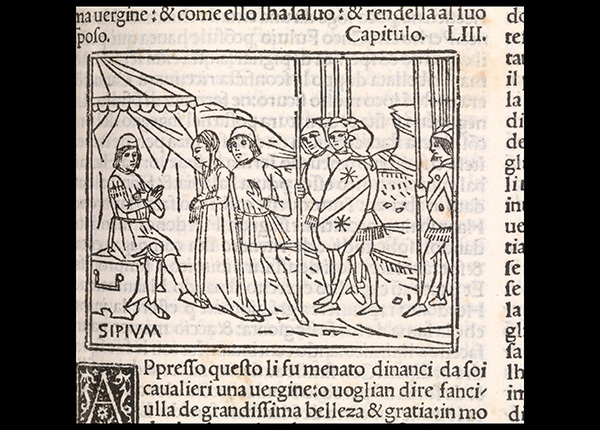Historic Document
Ab urbe condita (“From the City’s Foundation”) (ca. 27–9 BC)
Livy | 27–9 BC

The Metropolitan Museum of Art, New York, Rogers Fund, 1917
Summary
Titus Livius, known in English as Livy (59 BC – 17 AD), was author of a multi-volume history of Rome, from its beginnings through the reign of Augustus, entitled Ab urbe condita, “From the City’s Foundation.” Born in Gaul and trained in philosophy and rhetoric, Livy witnessed the series of civil wars that brought an end to the Roman republic; and, to the delight of Augustus, he devoted his life to writing a history of the republic’s origins, rise, and collapse. This work was exceedingly popular for centuries. But, after Constantine, much of it was lost. Americans in the revolutionary period consulted the early books, which were focused on the kingship, the establishment and defense of the republic, and its wars with its neighbors.
Selected by

Paul Rahe
Professor of History and Charles O. Lee and Louise K. Lee Chair in the Western Heritage at Hillsdale College

Jeffrey Rosen
President and CEO, National Constitution Center

Colleen A. Sheehan
Professor of Politics at the Arizona State University School of Civic and Economic Thought and Leadership
Document Excerpt
1.57
It happened that while these were drinking together, at the quarters of Sextus Tarquinius, where Collatinus Tarquinius, the son of Egerius, also supped, mention was made of their wives; each extolled his own to the skies: on this a dispute arising, Collatinus told them, that “there was no need of words; it could easily be known, in a few hours, how much his Lucretia excelled the rest: we are young and strong; let us mount our horses, and inspect in person the behaviour of our wives: that must be the most unexceptionable proof which meets our eyes, on the unexpected arrival of the husband.” . . . Having arrived there at the first dusk of the evening, they proceeded thence to Collatia, where they found Lucretia, not like the king’s daughters-in-law, whom they had seen spending their time in luxurious entertainments among those of their own rank, but busily employed with her wool, though at that late hour, and sitting in the middle of the house, with her maids at work around her: the honour of superiority among the ladies mentioned in the dispute, was of course acknowledged to belong to Lucretia. Her husband, on his arrival, and the Tarquinii, were kindly received; and the husband, exulting in his victory, gave the royal youths a friendly invitation. There, Sextus Tarquinius, instigated by brutal lust, formed a design of violating Lucretia’s chastity by force, both her beauty and her approved modesty serving as incentives: after this youthful frolic of the night, they returned to the camp.
1.58—A few days after, Sextus Tarquinius, without the knowledge of Collatinus, went to Collatia, with only a single attendant: he was kindly received by the family, who suspected not his design, and, after supper, conducted to the chamber where guests were lodged. Then, burning with desire, as soon as he thought that every thing was safe, and the family all at rest, he came with his sword drawn to Lucretia . . . . [H]is lust became victorious; and Tarquinius departed, applauding himself for this triumph over a lady’s honour. But Lucretia, plunged by such a disaster into the deepest distress, despatched a messenger to Rome to her father, with orders to proceed to Ardea to her husband, and to desire them to come to her, each with one faithful friend; to tell them, that there was a necessity for their doing so, and speedily; for that a dreadful affair had happened. . . . They found Lucretia sitting in her chamber, melancholy and dejected: on the arrival of her friends, she burst into tears, and on her husband’s asking, “Is all well?” “Far from it,” said she, “for how can it be well with a woman who has lost her chastity? Collatinus, the impression of another man is in your bed; yet my person only has been violated, my mind is guiltless, as my death will testify. But give me your right hands and pledge your honour, that the adulterer shall not escape unpunished . . . .” They all pledged their honour, one after another, and endeavoured to comfort her distracted mind, acquitting her of blame, as under the compulsion of force, and charging it on the violent perpetrator of the crime, told her, that “the mind alone was capable of sinning, not the body, and that where there was no such intention, there could be no guilt.” “It is your concern,” said she, “to consider what is due to him; as to me, though I acquit myself of the guilt, I cannot dispense with the penalty, nor shall any woman ever plead the example of Lucretia, for surviving her chastity.” Thus saying, she plunged into her heart a knife, which she had concealed under her garment, and falling forward on the wound, dropped lifeless. The husband and father shrieked aloud.
1.59—But Brutus, while they were overpowered by grief, drawing the knife from the wound of Lucretia, and holding it out reeking with blood, before him, said, “By this blood, most chaste until injured by royal insolence, I swear, and call you, O ye gods, to witness, that I will prosecute to destruction, by sword, fire, and every forcible means in my power, both Lucius Tarquinius the Proud, and his impious wife, together with their entire race, and never will suffer one of them, nor any other person whatsoever, to be king in Rome.” He then delivered the knife to Collatinus, afterwards to Lucretius, and Valerius, who were filled with amazement, as at a prodigy, and at a loss to account for this unusual elevation of sentiment in the mind of Brutus. However they took the oath as directed, and converting their grief into rage, followed Brutus, who put himself at their head, and called on them to proceed, instantly to abolish kingly power. . . . When they arrived [in Rome], the sight of such an armed multitude spread terror and confusion wherever they came: but, in a little time, when people observed the principal men of the state marching at their head, they concluded, that whatever the matter was, there must be good reason for it. Nor did the heinousness of the affair raise less violent emotions in the minds of the people at Rome, than it had at Collatia: so that, from all parts of the city, they hurried into the Forum; where, as soon as the party arrived, a crier summoned the people to attend the tribune of the Celeres, which office happened at that time to be held by Brutus. He there made a speech, no way consonant to that low degree of sensibility and capacity, which, until that day, he had counterfeited; recounting the violence and lust of Sextus Tarquinius, the shocking violation of Lucretia’s chastity, and her lamentable death . . . : to these representations he added the pride of the king himself, the miseries and toils of the commons, buried under ground to cleanse sinks and sewers, saying, that “the citizens of Rome, the conquerors of all the neighbouring nations, were, from warriors, reduced to labourers and stonecutters” . . . .
1.60—News of these proceedings having reached the camp, and the king, alarmed at such extraordinary events, having begun his march towards Rome, to suppress the commotions, Brutus, informed of his approach, turned into another road, in order to avoid a meeting, and very nearly at the same time, by different roads, Brutus arrived at Ardea, and Tarquinius at Rome. Tarquinius found the gates shut against him, and an order of banishment pronounced. The deliverer of the city was received in the camp with joy, and the king’s sons were driven thence with disgrace. Two of these followed their father, and went into exile at Cære, among the Etrurians. Sextus Tarquinius having retired to Gabii, as if to his own dominions, was slain by some persons, who were glad of an opportunity of gratifying old animosities, which he had excited there by his rapine and murders. Lucius Tarquinius Superbus reigned twenty five years. The government of kings continued, from the building of the city to the establishment of its liberty, two hundred and forty-four years. After that, in an assembly of the Centuries, held by the præfect of the city, were elected, conformably to a plan found in the commentaries of Servius Tullius, two magistrates, called Consuls. These were, Lucius Junius Brutus, and Lucius Tarquinius Collatinus.




